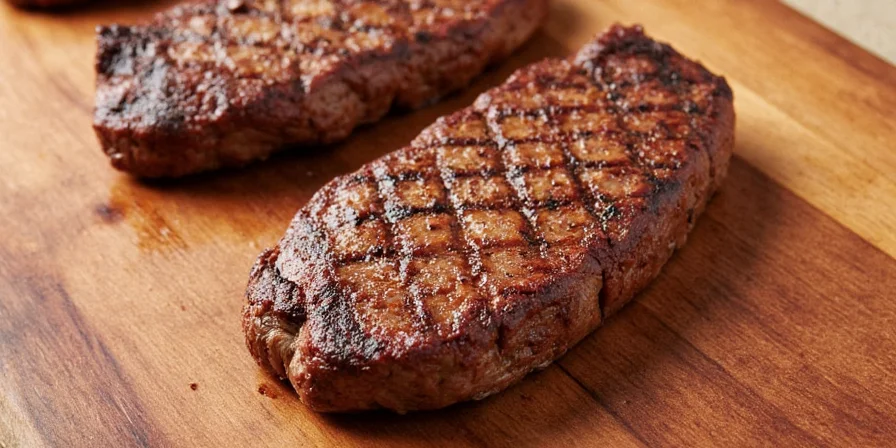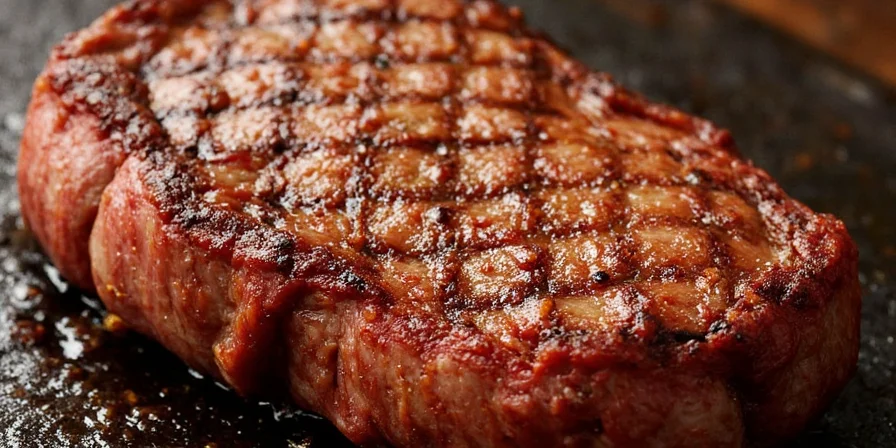Stop wondering how to season steak properly. The perfect method: Apply 1 teaspoon kosher salt per pound of steak 45-60 minutes before cooking, followed by freshly ground black pepper and other spices just before searing. This timing allows salt to penetrate while preserving volatile compounds in heat-sensitive spices. For most cuts, this simple two-step approach delivers perfectly seasoned steak every time.
This guide reveals exactly why timing matters, which spices work best for each cut, and how to avoid the 5 most common seasoning mistakes that ruin expensive steaks. Get restaurant-quality results at home with these science-backed techniques.
Quick Reference: Basic Steak Seasoning Guide
- Salt application: 1 tsp kosher salt per pound, 45-60 minutes pre-cook
- Pepper application: Freshly ground, 5-10 minutes pre-cook
- Other spices: Apply just before cooking to preserve volatile compounds
- Key mistake to avoid: Seasoning too early with heat-sensitive spices like cayenne
- Best for beginners: Classic 4-ingredient rub (salt, pepper, garlic powder, smoked paprika)
Why Most Steak Seasoning Advice Is Wrong
Conventional wisdom says "salt and pepper an hour before"—but this oversimplifies the complex biochemistry of meat seasoning. Applying all spices simultaneously causes heat-sensitive compounds to degrade before searing even begins. Understanding the science behind timing and spice chemistry transforms mediocre steak into extraordinary results.
| Spice | Optimal Application Time | Reason | Common Mistake |
|---|---|---|---|
| Salt | 45-60 minutes pre-cook | Needs time to dissolve and reabsorb through osmosis | Applying too close to cooking |
| Black Pepper | 5-10 minutes pre-cook | Piperine degrades at high heat | Applying with salt |
| Cayenne/Chili Powder | Just before cooking | Capsaicin breaks down rapidly | Applying too early |
| Fresh Herbs | During final 2 minutes of cooking | Volatile oils evaporate quickly | Adding at beginning |
| Garlic Powder | With salt or just before cooking | Stable compounds withstand heat | Using fresh garlic (burns easily) |
The 5-Step Perfect Steak Seasoning Method
- Dry the surface: Pat steak thoroughly with paper towels (critical for proper adhesion)
- Apply salt: 1 tsp kosher salt per pound, pressing gently into surface
- Rest: 45-60 minutes at room temperature (allows salt absorption)
- Add finishing spices: Pepper and heat elements 5-10 minutes before cooking
- Press firmly: Ensure even coverage on all sides including edges
Cut-Specific Seasoning Cheat Sheet
Fat content and muscle structure determine which spices work best. Generic "one-size-fits-all" approaches fail because ribeye's marbling carries fat-soluble compounds differently than tenderloin's lean structure.
| Cut | Ideal Seasoning Time | Best Spice Combinations | Avoid |
|---|---|---|---|
| Ribeye (1-1.5") | Salt: 60 min pre-cook Pepper: 10 min pre-cook |
Salt, coarse pepper, garlic powder, rosemary | Excessive heat elements |
| Filet Mignon | Salt: 45 min pre-cook Pepper: 5 min pre-cook |
Salt, white pepper, lemon zest, thyme | Strong spices like cumin |
| Flank Steak | Salt: 45 min pre-cook Spices: Immediately pre-cook |
Chili powder, cumin, smoked paprika, lime zest | Salt-heavy blends |
| New York Strip | Salt: 50 min pre-cook Pepper: 8 min pre-cook |
Salt, black pepper, garlic powder, onion powder | Sweet elements |
| Skirt Steak | Salt: 40 min pre-cook Spices: Immediately pre-cook |
Chili powder, cumin, cayenne, oregano | Salt-only seasoning |
3 Proven Steak Rub Recipes for Home Cooks
1. Foolproof Basic Steak Rub (for beginners)
The perfect starting point for any cut. This balanced blend enhances natural beef flavors without overpowering.
- 1 tsp kosher salt
- ½ tsp freshly ground black pepper
- ¼ tsp garlic powder
- ¼ tsp smoked paprika
How to use: Mix thoroughly and press firmly onto steak surfaces 45 minutes before cooking. Perfect for ribeyes, New York strips, and sirloin.

2. Bold Southwest Rub (for flank or skirt steak)
Designed specifically for lean, open-grained cuts that need bold flavors to compensate for lower marbling.
- 1 tsp chili powder
- ½ tsp cumin
- ½ tsp smoked paprika
- ¼ tsp cayenne pepper
- 1 tsp salt
How to use: Apply salt 45 minutes pre-cook, then add spice blend just before cooking. Finish with fresh lime juice to balance heat.

3. Luxury Herb Blend (for premium cuts)
Maximizes aroma retention for special occasion steaks like filet mignon or ribeye.
- 1 tbsp finely chopped fresh rosemary
- 1 tbsp finely chopped fresh thyme
- 1 tsp coarse sea salt
- ½ tsp cracked black pepper
- 1 tsp olive oil
How to use: Brush olive oil on steak, then press herbs onto surface immediately before searing. The oil creates a protective layer that reduces aromatic compound evaporation.

Avoid These 5 Steak Seasoning Mistakes
- Mistake #1: Using table salt instead of kosher salt (table salt is denser and causes over-salting)
- Mistake #2: Not pressing seasoning into the meat (results in uneven flavor)
- Mistake #3: Seasoning too early with heat-sensitive spices like cayenne (loses 60% potency before cooking)
- Mistake #4: Forgetting to season the edges (where moisture loss occurs fastest)
- Mistake #5: Using pre-mixed "steak seasoning" with sugar (causes premature burning)
Frequently Asked Questions
How much salt should I use per pound of steak?
Use 1 teaspoon of kosher salt per pound of steak. For table salt, reduce to ¾ teaspoon due to its higher density. For quick-cook steaks (under 1 inch thick), reduce by 25% and consider adding a pinch of sugar to moderate salt perception.
Why does salt need 45-60 minutes to work properly?
Salt initially draws out surface moisture through osmosis. As it dissolves in this liquid, it forms a brine that's gradually reabsorbed into muscle fibers over 45-60 minutes. This process seasons the interior evenly and modifies protein structure to retain moisture during cooking. Rushing this leaves seasoning only on the surface, creating uneven flavor.
Can I use fresh garlic instead of garlic powder?
Fresh garlic burns easily at high searing temperatures, creating bitter compounds. Garlic powder provides consistent flavor without burning. If using fresh garlic, add it during the final 2 minutes of cooking or as a post-sear finishing touch.
Should I rinse off the salt before cooking?
No—rinsing removes the seasoning you've applied. The salt has already been reabsorbed into the meat during the resting period. Pat the surface dry if needed, but don't rinse.
How do I fix over-seasoned steak?
If you've over-salted, place the steak in the refrigerator for 15-20 minutes to slow moisture loss. During cooking, avoid high heat that would accelerate salt concentration. After cooking, serve with acid (lemon juice or vinegar-based sauce) to balance the saltiness.
Final Tips for Perfectly Seasoned Steak Every Time
- Test your rub: Cook a small trimmings piece first to check seasoning balance
- Season all sides: Don't forget the edges where moisture evaporates fastest
- Use proper tools: A microplane for citrus zest, mortar and pestle for fresh pepper
- Track your timing: Note application-to-cook intervals for consistent results
- Store blends properly: Keep in airtight containers away from heat and light
Mastering steak seasoning isn't about complicated recipes—it's understanding the simple timing principles that transform your results. Start with the basic salt-and-pepper method, then gradually experiment with additional spices as you gain confidence. The perfect seasoning doesn't announce itself—it makes the steak unforgettable.












 浙公网安备
33010002000092号
浙公网安备
33010002000092号 浙B2-20120091-4
浙B2-20120091-4